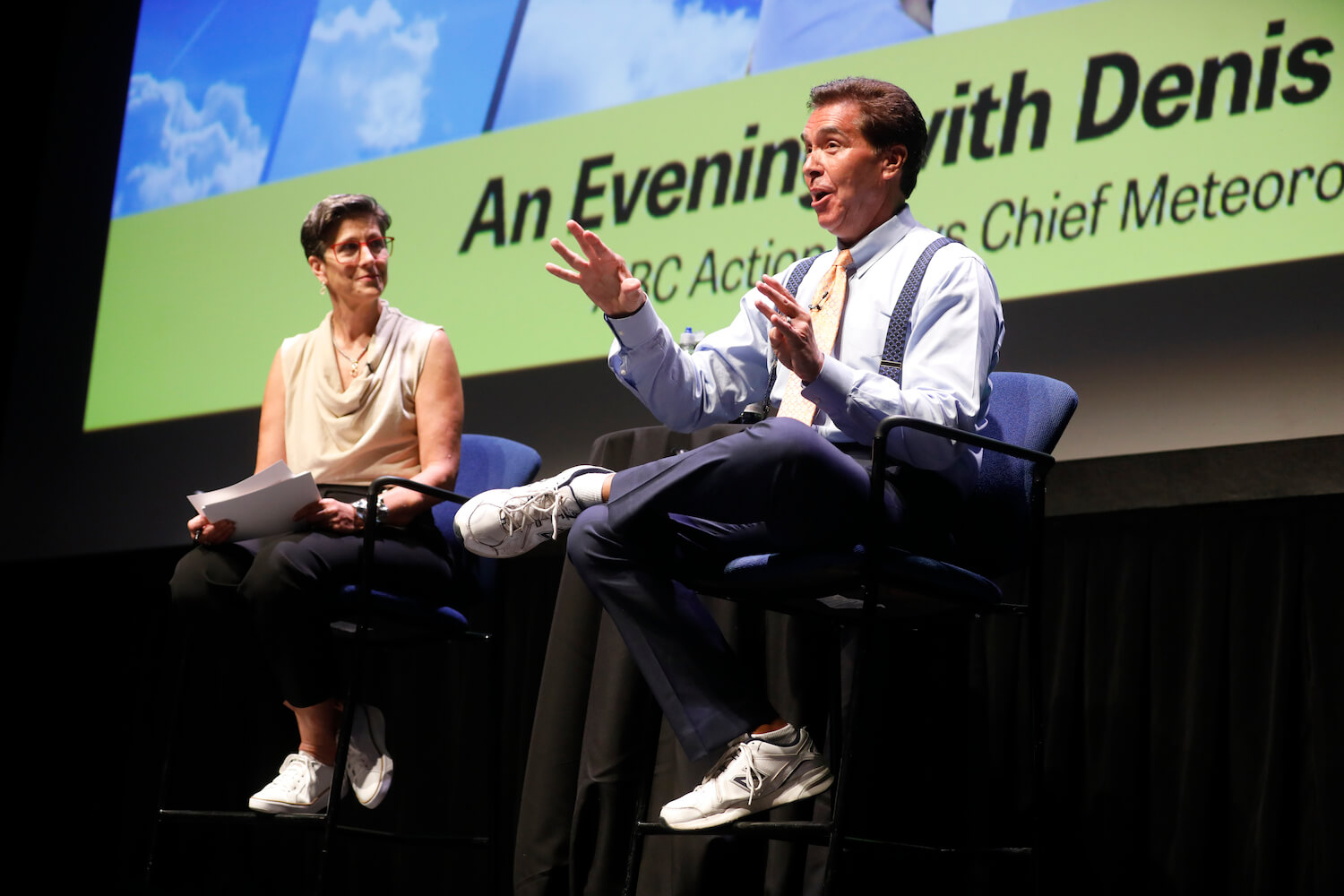For the first 10 to 15 years of Denis Phillips’ career as a meteorologist, all he cared about was getting the weather right.
But during Hurricane Charley in 2004, ABC Action News chief meteorologist Denis Phillips learned that his job wasn’t just getting the weather right, it was providing his community with the tools they needed to survive severe weather.
“It took me having a wife and kids, people who I love (in danger) — I learned it’s about getting people through storms,” he said.
Phillips was featured at a Poynter at the Straz Speaker event at the Straz Center in Tampa on May 12. The evening also included a panel discussion from leaders in environmental communication in Florida.
For decades, Tampa Bay residents have relied on Phillips’ guidance during severe weather, more recently on social media. His Facebook page is a wealth of resources year-round, and a flurry of essential information when storms approach.
The weatherman is a household name around hurricane season in Tampa Bay thanks to his calm demeanor, significant accuracy and tendency to tell it like it is with his famous Rule No. 7: “Stop freaking out … until I tell you to. We’re fine.”
“How in the world are you going to make a decision that’s going to affect you and your family, if your head’s not screwed on straight and you’re not thinking right?”
Phillips said Rule No. 7 isn’t a promise that Tampa Bay residents will be unaffected, but it’s a reminder that, armed with trusted information, individuals can be the calm in the storm when it comes to hurricane preparedness.
Phillips says it’s up to local meteorologists to lessen the hype.
“There are overzealous producers out there, and it’s my job to say ‘let’s tone it down a bit,’” Phillips said.
The news market in Tampa Bay is interesting and volatile, Phillips said, and he has no plans to leave.
“I’m not going anywhere,” Phillips promised to moderator and Poynter senior vice president Kelly McBride. “And I hear from people, ‘Oh, don’t retire.’ And I say, ‘Look, I’ve got an 8-year-old.’”
Later in the evening, the Ferguson Hall crowd heard from a panel of journalists, insurance professionals and Dr. Jo Huxster, associate professor of environmental studies at Eckerd College.
“It turns out that we human beings are not very good at risk perception,” she said. “Local meteorologists and local forecasters are some of the most trusted science communicators in the United States.”
Local meteorologists are important to identifying long-term trends. A loyal, tuned-in audience gives them many opportunities to string together a story about climate.
“The best science communicators are storytellers,” Huxster said.
“Why is it that we don’t talk about climate?” Huxster asked. “At the heart of it, climate is long-term trends about weather. The word ‘climate’ has become really politicized.”
Huxster said that even though the instruments that we use to measure climate and temperature are very trusted, the rhetoric about science has become very political.
“It’s not really about the numbers, it’s about the solutions that make people politically uncomfortable.”
Collective climate goals such as “clean air” and “clean water” are unanimous and achievable, especially at the local level, Huxster said. With those aims in sight, and armed with accurate climate information, she said Tampa Bay can take the policy- and individual responsibility-steps toward a brighter future for the environment.
Day-to-day, people are worried about their homes and property, said Nancy Dominguez, managing director at the Florida Association of Public Insurance Adjusters. She recommends documenting everything.
“Take pictures, take video of your home before the storm,” Dominguez said. “Take inventory of your items, especially high-end items with model numbers, save all this information to the cloud with a copy of your declaration page (insurance policy).”
Dominguez said hurricane deductibles in the state of Florida are typically much higher than the standard. She warned of fluctuating rates and low payments in the wake of storms, and unregistered insurance adjusters.
“Some of the payments have been very low,” Dominguez said of payments from Hurricane Ian, which killed 150 residents of Southwest Florida and caused more than $100 billion in property damage in September 2022.
Phillips teared up when McBride asked about his proudest professional moment. “Probably tonight.”
“Because you don’t think that you have as much of an impact on people’s lives,” Phillips said to the full auditorium of adoring Tampa Bay fans.
